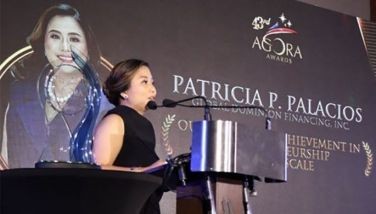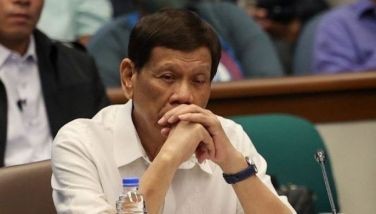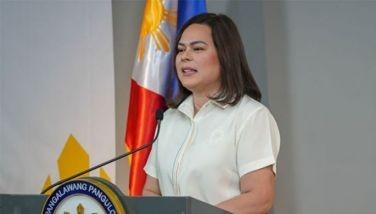Blame the messenger

These are difficult times for journalism. I started my journalism career in the years just before martial law. As I recall, even those years were not as horrible as it is now.
Somehow, even the dictatorial Mr. Marcos respected the institution of a free press before he declared martial law. Martial law was of course different. Mr. Marcos decided he didn’t want honest reporting of how he was running government.
After 1081, journalists were required to get permission from his gatekeepers before they could earn a living as journalists. Those were times I hope our people will never again allow to happen.
Having a muzzled media is the worst case scenario. I know muzzling media is more difficult to do in this digital age, but looking at China, it can be done.
Unless Filipinos insist an independent media is an absolute necessity, we may wake up one day not having one. I say this out of experience.
I did wake up one Saturday morning in September 1972 with nothing but static noises on the radio and all television channels showing color bars. Later that afternoon, RPN Channel 9 under Marcos crony Bobby Benedicto showed cartoons… various episodes of The Wacky Races in a continuous loop.
It is unfortunate the Trump and Duterte administrations have chosen to badmouth traditional media to rally their forces against anyone who disagrees with them. Their diehard supporters then bully everyone into conformity and that threatens our democracy.
I am not saying traditional media is faultless, but our system of a free press is self cleansing. Mistakes are easily pointed out by an alert citizenry and responsible media practitioners make proper amends.
I would rather have our imperfect system that corrects itself than have a government that forces us to believe its version of truth. Because no government is infallible and officials are susceptible to abuse of power, we must always be able to seek the truth without Big Brother coercion.
Many recent events should warn us that all is not well. There is this propensity of the administration and its minions to blame media for problems they have created themselves. Every report that does not conform to what they want is tagged as “biased” reporting.
The President himself publicly cursed a broadsheet and the leading broadcast network for perceived attacks against him. A close examination of the accusation against the broadsheet leads one to conclude the President himself is to blame for the problem.
I guess it dawned on the President that he said something he shouldn’t have. But the realization came only after the broadsheet captured the essence of his statement in a very catchy headline. Writing catchy headlines is what good editors do. The President cannot deny he said the poor are a necessary collateral damage in the war against drugs. In the President’s words, sorry na lang.
Against the television network, there was nothing specific in the President’s charges that brought about his cuss words. He said something about the story he had P200 million in his bank account. But every news outlet carried that story during the heated campaign period. Why pick on the network so many months after?
The President’s tirade against the network surprised me. I have been keeping close tabs on the network’s news operations the past few years. I am not aware of anything the news programs have reported in recent memory that would justify the President’s curses.
I have long retired from active management of the news group, but I visit the newsroom often to chew the fat with editors, producers and reporters. I do this because I yearn for the bustle of a newsroom, asking about inside stories behind the news and getting a perspective of the news one cannot get by only consuming media output.
I am ready to vouch for the professionalism of the folks operating the network’s newsroom. Those young and eager reporters with a lifetime career ahead of them make an honest effort to deliver the news as clearly and as personally detached as is humanly possible.
Beyond that, I am proud to be associated with the newsroom’s management team of seasoned journalists led by Ging Reyes who worked under my leadership in the ‘90s and who established the network’s North American operations. This management team follows a strict ethics manual that makes sure no one among the network’s reporters and producers can be accused of unprofessional behavior.
They also have an ombudsman reporting to the network’s board that investigates and responds to every complaint about the network’s presentation of the news. If only President Duterte has a bill of particulars, I am sure proper investigation will take place and remedial measures taken.
Indeed, I know for a fact that the network’s ombudsman has recommended sanctions on personnel found to have violated the network’s Code of Ethics. Suspension and even separation from service have happened.
It is unfair for the President to just make a blanket accusation peppered with curses because the professionals in the organization do feel slighted over this affront on their being. The President should try and test the ability of the network’s internal review mechanisms to address his complaints.
The network and all traditional media for that matter, depend on public trust for their continued existence. Unlike politicians, traditional media earn this trust every minute, every hour, every day. Being truthful as best as they can is a business imperative as much as a professional responsibility.
Truth to tell, the problems of the two presidents are largely self inflicted. But like their handlers, they try to get out of the holes they dug themselves in by blaming the messenger. Their ineffective and incompetent spokesmen, unable to explain the unexplainable, find it easier to blame media for their professional shortcomings.
Continually blaming the messengers will risk marginalizing an important pillar of our democracy. Even investors will take notice and regard the country as a less desirable place to do business without a free press.
Journalists are necessary to keep the public informed. Journalists help keep government officials honest and the public interest served.
Let us be clear that not everything journalists write or report will be pleasing to the powers that be. A healthy adversarial relationship between officials and journalists is necessary for a well functioning democracy. My late mentor and boss, Max Soliven, once instructed me that it is our job as journalists to comfort the afflicted and afflict the comfortable.
George Orwell summed up our function best of all: “Journalism is printing what someone else does not want printed: everything else is public relations.”
Boo Chanco’s e-mail address is bchanco@gmail.com. Follow him on Twitter @boochanco
- Latest
- Trending




























